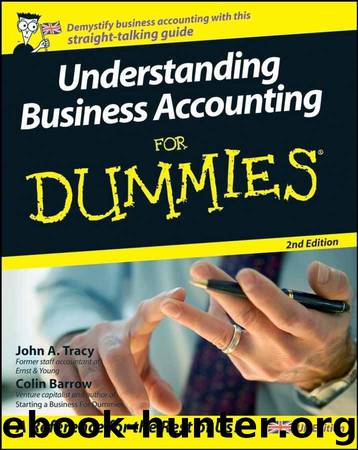Understanding Business Accounting for Dummies by John A. Tracy; Colin Barrow

Author:John A. Tracy; Colin Barrow
Language: eng
Format: mobi
Tags: Accounting, Business & Economics, General
ISBN: 9780764570254
Publisher: Wiley
Published: 2004-07-15T05:00:00+00:00
Chapter 10: Business Budgeting
In This Chapter
Discovering the benefits of budgeting
Designing accounting reports for managers
Budgeting in action: developing a profit plan and projecting cash flow from profit
Investing for the long haul
Staying flexible with budgets
A business can't open its doors each day without having some idea of what to expect. And it can't close its doors at the end of the day not knowing what happened. In the Boy Scouts, the motto is ‘Be Prepared'. Likewise, a business should plan and be prepared for its future, and should control its actual performance to reach its financial goals. The only question is how.
Budgeting is one answer. Please be careful with this term. Budgeting does not refer to putting a financial straitjacket on a business. Instead, business budgeting refers to setting specific goals and having the detailed plans necessary to achieve the goals. Business budgeting is built on realistic forecasts for the coming period, and demands that managers develop a thorough understanding of the profit blueprint of the business as well as the financial effects of the business's profit-making activities. A business budget is an integrated plan of action - not simply a few trend lines on a financial chart. Business managers have two broad options - they can wait for results to be reported to them on a ‘look back' basis, or they can look ahead and plan what profit and cash flow should be, and then compare actual results against the plan. Budgeting is the method used to enact this second option.
The financial statements included in the annual financial report of a business are prepared after the fact; that is, the statements are based on actual transactions that have already taken place. Budgeted financial statements, on the other hand, are prepared before the fact, and are based on future transactions that you expect to take place based on the business's profit and financial strategy and goals. These forward-looking financial statements are referred to as pro forma, which is Latin for ‘provided in advance'. Note: Budgeted financial statements are not reported outside the business; they are strictly for internal management use.
Download
This site does not store any files on its server. We only index and link to content provided by other sites. Please contact the content providers to delete copyright contents if any and email us, we'll remove relevant links or contents immediately.
Zero to IPO: Over $1 Trillion of Actionable Advice from the World's Most Successful Entrepreneurs by Frederic Kerrest(4073)
Machine Learning at Scale with H2O by Gregory Keys | David Whiting(3654)
Harry Potter and the Goblet Of Fire by J.K. Rowling(3615)
Never by Ken Follett(3545)
Ogilvy on Advertising by David Ogilvy(3349)
Shadow of Night by Deborah Harkness(3181)
The Man Who Died Twice by Richard Osman(2818)
Book of Life by Deborah Harkness(2726)
My Brilliant Friend by Elena Ferrante(2707)
How Proust Can Change Your Life by Alain De Botton(2620)
0041152001443424520 .pdf by Unknown(2608)
Will by Will Smith(2589)
The Tipping Point by Malcolm Gladwell(2565)
How to Pay Zero Taxes, 2018 by Jeff A. Schnepper(2505)
Purple Hibiscus by Chimamanda Ngozi Adichie(2501)
Hooked: A Dark, Contemporary Romance (Never After Series) by Emily McIntire(2428)
Rationality by Steven Pinker(2156)
Borders by unknow(2121)
Daughter of Smoke and Bone by Laini Taylor(2086)
